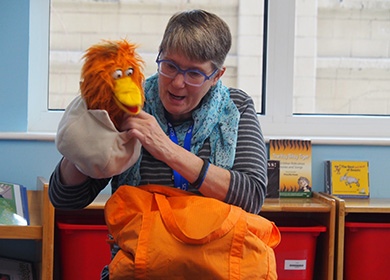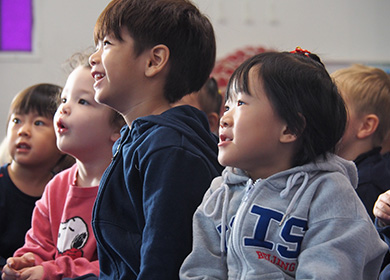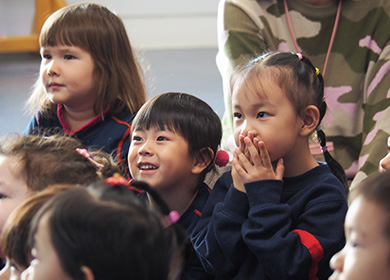Go Back
News
News
Storytelling Techniques, Tips and Tricks
News
29 Nov, 2019
10 : 00
With this being her second visit to Yew Chung International School of Beijing, Priscilla Howe once again used humour, singing and the help of her puppets to captivate our kindergarten learners. With over 25 years of storytelling experience, the former librarian had some valuable tips to share with parents who would like to introduce storytelling to their little ones and talk to us about why it is crucial to incorporate storytelling for children's development.
"For one thing, storytelling is a socially wonderful thing to do, but also, telling stories builds a lot of pre-reading skills. Children learn prediction, sequencing and how stories are structured in our lives. Those are all great skills for before they start to read" Priscilla explained.
Her words were reiterated by Maryanne Harper, ECE Co-ordinator who said "Storytelling provides children with opportunities to develop language, communication and literacy skills. Participation also engages children with physical skills and promotes confidence and collaboration".
The collaboration aspect, she believes, can include parents and children "acting out stories together" or parents could "take videos of the children telling their stories or scribe their words for them to make a book".
The challenging part for many parents when choosing to tell stories is not only the techniques, but may also be the difficulty in deciding on what kinds of stories they should be telling to their children, to begin with. Should they tell funny, educational, or just stories their children prefer?
According to Priscilla telling stories to younger and older children differs, and parents need to make note of that "With older children the stories can be a bit more philosophical – there can be more ambiguity" but with younger children, this may not apply. For example, adding sarcasm and irony would not work with young children. The attention span of these groups also differs; therefore, it is important to for parents to always be cognizant of this fact.
This is the reason Priscilla recommends folktales as they are the "taproot of our culture, they pass along what we feel is important, and they are fun" she says. She also advises for parents to "Try using puppets, different intonation and different voices to capture their attention but most importantly, tell stories that you love" she says. According to her, if you are not passionate about the stories you are telling, children will pick up on that and not respond well to the stories.
Below are some of the tips she gives for parents who would like to introduce storytelling;
• Parents should tell some of the stories they remember from when they were children. It helps connect with children.• Do not be afraid to use words children don't know, as it also improves their vocabulary.• Because all children's needs differ, try to use rhyme, repetition, song, movement, sounds, images and describing. This way you can establish which method works best for your child. • Make up stories.• Play pass it on story games. They encourage children to be creative and think on their feet. They are also a great way for families to spend time together.
The final and most important tip she gave was "Don't forget to make it fun".
To learn more about Priscilla Howe and her work, visit www.priscillahowe.com












